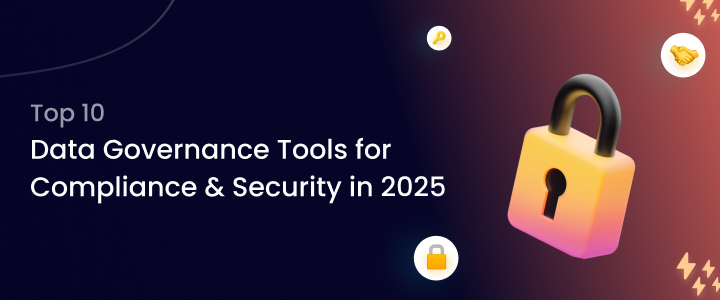

Sign Up
What is best time for the call?
Oops! Something went wrong while submitting the form.

Organizations face immense pressure to maintain control over their data assets in today's data-first world. The need for enterprise-grade data governance tools has never been more urgent, from rising privacy regulations (like GDPR, CCPA, HIPAA) to growing cloud complexity.
In 2025, leading organizations are investing in data governance platforms that offer compliance and policy enforcement and integrate security, metadata management, and data quality automation. This blog reviews the Top 10 Data Governance Tools for 2025, focusing on pricing, licensing options, feature comparison, and tool integrations based on authoritative insights from G2, Gartner, and Forrester.
Data governance tools are software and processes that help organizations manage data from creation to disposal, ensuring its accuracy, reliability, and security while meeting compliance requirements. These tools assist in establishing policies, procedures, and access controls to protect sensitive data and maintain data quality, ultimately contributing to better decision-making and risk management.
What is data governance and compliance?
Data governance is an internal organizational approach to managing data. Data compliance ensures that your governance approach meets external data handling, privacy, and use standards. Data compliance is part of an agile, collaborative data governance program with the right people, processes, and tools in place.
What are the 4 pillars of data governance?
The four main pillars of data governance are quality, stewardship, protection and compliance, and management. These pillars ensure that data is accurate, secure, and used responsibly within an organization.
What is a data governance tool?
Data governance tools leverage AI and ML to provide automation to effectively counter the complexities of managing large volumes of data. These complexities include diverse data types, disparate data sources, and ever-changing regulatory policies that impact appropriate uses.
What are the 3 key roles of data governance?
A data governance role is a specific position within an organization responsible for managing, protecting, and ensuring data quality. Key roles include data admin, data steward, data custodian, and data user, each with distinct responsibilities contributing to effective data governance.
Why Data Governance Tools Are Critical in 2025?
Evaluation Criteria
We selected tools based on the following:
Overview: A market leader offering end-to-end data governance, privacy, and policy management.
✅ Pros: Rich governance tools
❌ Cons: Requires expert configuration
Screenshot:

Overview: A data intelligence platform with embedded governance workflows and a collaborative data catalog.
✅ Pros: Easy to adopt
❌ Cons: Limited deep security controls
Screenshot:

Overview: Comprehensive governance and metadata platform tightly integrated with Informatica’s cloud ecosystem.
✅ Pros: Robust enterprise stack
❌ Cons: Steep learning curve
Screenshot:

Overview: Privacy-first platform expanding into full data governance, lineage, and policy automation.
✅ Pros: Best for privacy+compliance
❌ Cons: Developing broader governance scope
Screenshot:

Overview: A modern data governance solution for agile teams with active metadata and integrations.
✅ Pros: Intuitive and fast
❌ Cons: Lacks deep enterprise compliance features
Screenshot:

Overview: Azure-native governance and compliance solution integrating Microsoft 365 and Power Platform.
✅ Pros: Native Microsoft security
❌ Cons: Best suited to Microsoft users
Screenshot:

Overview: The governance engine was built into IBM Cloud Pak for data with machine learning-driven insights.
✅ Pros: Advanced automation
❌ Cons: Heavy for lightweight governance use cases
Screenshot:

Overview: Governance, orchestration, and pipeline tool for SAP and non-SAP data landscapes.
✅ Pros: SAP-native governance
❌ Cons: Narrow ecosystem fit
Screenshot:

Overview: An affordable yet feature-rich governance platform for data catalogs, privacy, and compliance.
✅ Pros: Value for cost
❌ Cons: UI less polished than top-tier peers
Screenshot:

Overview: AI-powered data governance and discovery engine for PII, HIPAA, and PCI compliance.
✅ Pros: Fast deployment
❌ Cons: Best for data privacy, not full governance stack
Screenshot:

What are the 5 knows of data governance?
The five key considerations are data classification and categorization, data access and control, data lifecycle management, data audit and monitoring, and change management and data governance adoption.
Is Collibra a data governance tool?
Collibra Data Intelligence Platform offers comprehensive functional support for search & discovery, data & AI governance, data marketplaces, collaboration, and customer enablement use cases.
What are the 3 key roles of data governance?
A data governance role is a specific position within an organization responsible for managing, protecting, and ensuring data quality. Key roles include data admin, data steward, data custodian, and data user, each with distinct responsibilities contributing to effective data governance.
Is Collibra an MDM tool?
It is a cloud-native data intelligence platform frequently integrated into MDM systems to bolster governance and stewardship.
While tools like Collibra and Informatica govern enterprise data infrastructure, CloudNuro.ai offers complete SaaS governance—including license tracking, user activity monitoring across cloud apps.
Why CloudNuro for SaaS Governance?
🎯 Book a Demo to see how CloudNuro integrates with your data governance ecosystem to extend compliance beyond traditional infrastructure.
Request a no cost, no obligation free assessment —just 15 minutes to savings!
Get StartedOrganizations face immense pressure to maintain control over their data assets in today's data-first world. The need for enterprise-grade data governance tools has never been more urgent, from rising privacy regulations (like GDPR, CCPA, HIPAA) to growing cloud complexity.
In 2025, leading organizations are investing in data governance platforms that offer compliance and policy enforcement and integrate security, metadata management, and data quality automation. This blog reviews the Top 10 Data Governance Tools for 2025, focusing on pricing, licensing options, feature comparison, and tool integrations based on authoritative insights from G2, Gartner, and Forrester.
Data governance tools are software and processes that help organizations manage data from creation to disposal, ensuring its accuracy, reliability, and security while meeting compliance requirements. These tools assist in establishing policies, procedures, and access controls to protect sensitive data and maintain data quality, ultimately contributing to better decision-making and risk management.
What is data governance and compliance?
Data governance is an internal organizational approach to managing data. Data compliance ensures that your governance approach meets external data handling, privacy, and use standards. Data compliance is part of an agile, collaborative data governance program with the right people, processes, and tools in place.
What are the 4 pillars of data governance?
The four main pillars of data governance are quality, stewardship, protection and compliance, and management. These pillars ensure that data is accurate, secure, and used responsibly within an organization.
What is a data governance tool?
Data governance tools leverage AI and ML to provide automation to effectively counter the complexities of managing large volumes of data. These complexities include diverse data types, disparate data sources, and ever-changing regulatory policies that impact appropriate uses.
What are the 3 key roles of data governance?
A data governance role is a specific position within an organization responsible for managing, protecting, and ensuring data quality. Key roles include data admin, data steward, data custodian, and data user, each with distinct responsibilities contributing to effective data governance.
Why Data Governance Tools Are Critical in 2025?
Evaluation Criteria
We selected tools based on the following:
Overview: A market leader offering end-to-end data governance, privacy, and policy management.
✅ Pros: Rich governance tools
❌ Cons: Requires expert configuration
Screenshot:

Overview: A data intelligence platform with embedded governance workflows and a collaborative data catalog.
✅ Pros: Easy to adopt
❌ Cons: Limited deep security controls
Screenshot:

Overview: Comprehensive governance and metadata platform tightly integrated with Informatica’s cloud ecosystem.
✅ Pros: Robust enterprise stack
❌ Cons: Steep learning curve
Screenshot:

Overview: Privacy-first platform expanding into full data governance, lineage, and policy automation.
✅ Pros: Best for privacy+compliance
❌ Cons: Developing broader governance scope
Screenshot:

Overview: A modern data governance solution for agile teams with active metadata and integrations.
✅ Pros: Intuitive and fast
❌ Cons: Lacks deep enterprise compliance features
Screenshot:

Overview: Azure-native governance and compliance solution integrating Microsoft 365 and Power Platform.
✅ Pros: Native Microsoft security
❌ Cons: Best suited to Microsoft users
Screenshot:

Overview: The governance engine was built into IBM Cloud Pak for data with machine learning-driven insights.
✅ Pros: Advanced automation
❌ Cons: Heavy for lightweight governance use cases
Screenshot:

Overview: Governance, orchestration, and pipeline tool for SAP and non-SAP data landscapes.
✅ Pros: SAP-native governance
❌ Cons: Narrow ecosystem fit
Screenshot:

Overview: An affordable yet feature-rich governance platform for data catalogs, privacy, and compliance.
✅ Pros: Value for cost
❌ Cons: UI less polished than top-tier peers
Screenshot:

Overview: AI-powered data governance and discovery engine for PII, HIPAA, and PCI compliance.
✅ Pros: Fast deployment
❌ Cons: Best for data privacy, not full governance stack
Screenshot:

What are the 5 knows of data governance?
The five key considerations are data classification and categorization, data access and control, data lifecycle management, data audit and monitoring, and change management and data governance adoption.
Is Collibra a data governance tool?
Collibra Data Intelligence Platform offers comprehensive functional support for search & discovery, data & AI governance, data marketplaces, collaboration, and customer enablement use cases.
What are the 3 key roles of data governance?
A data governance role is a specific position within an organization responsible for managing, protecting, and ensuring data quality. Key roles include data admin, data steward, data custodian, and data user, each with distinct responsibilities contributing to effective data governance.
Is Collibra an MDM tool?
It is a cloud-native data intelligence platform frequently integrated into MDM systems to bolster governance and stewardship.
While tools like Collibra and Informatica govern enterprise data infrastructure, CloudNuro.ai offers complete SaaS governance—including license tracking, user activity monitoring across cloud apps.
Why CloudNuro for SaaS Governance?
🎯 Book a Demo to see how CloudNuro integrates with your data governance ecosystem to extend compliance beyond traditional infrastructure.
Request a no cost, no obligation free assessment - just 15 minutes to savings!
Get StartedWe're offering complimentary ServiceNow license assessments to only 25 enterprises this quarter who want to unlock immediate savings without disrupting operations.
Get Free AssessmentGet Started

Recognized Leader in SaaS Management Platforms by Info-Tech SoftwareReviews
